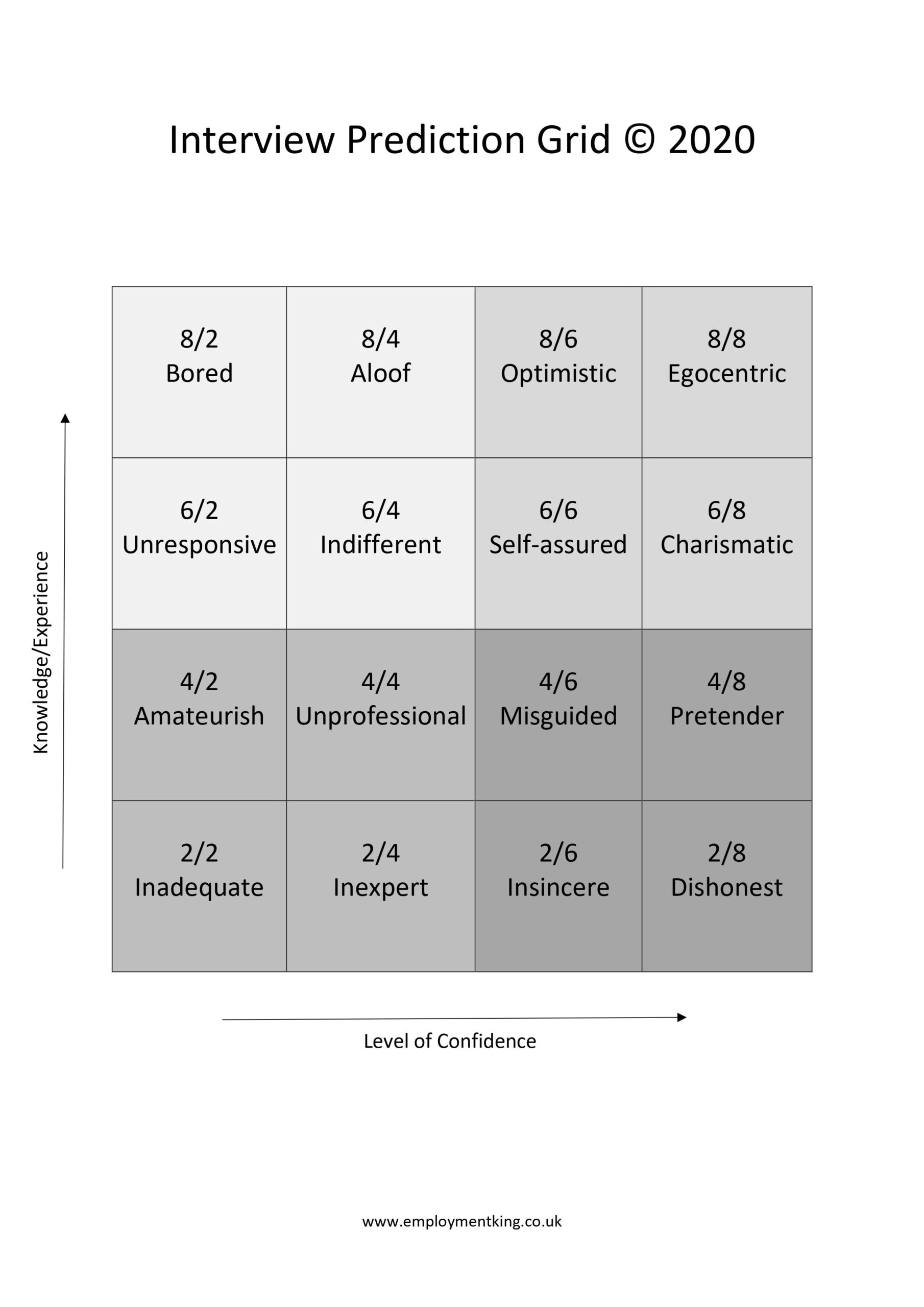Congratulations on completing the Interview Prediction Grid Test (IPG) ©2020.
Below is a breakdown of your Interview Identity
4/4 – Unprofessional

Out of all the low/low identities, the 4/4 – Unprofessional interviewee is the most likely job applicant, in this segment, to be offered a paid position. But, compared to other applicants from the additional three segments, the 4/4 – Unprofessional applicant will be seen as a weaker candidate.
The employer will be aware of the 4/4 –Unprofessional applicant’s knowledge/experience level as the candidate has a sufficient level of confidence that allows the interviewee to give a more detailed reply to job interview questions. This detail allows the interviewer to gain an understanding of the candidate’s strengths and weaknesses.
In most recruitment campaigns, a 4/4 – Unprofessional interviewee will be seen as below the required level of standard for paid employment. For some large recruitment drives and/or for large organisations or voluntary employers, who have the time to support a new recruit, the 4/4 – Unprofessional interviewee can have a successful interview outcome
Strengths
The combination of the sufficient knowledge/experience and confidence shows potential. It is the competition, which possess a higher level of knowledge/experience and/or level of confidence that are more likely to be offered the paid position.
Being in possession of several soft skills makes the 4/4 – Unprofessional applicant suitable for several potential career sectors. It is sometimes a lack of career focus that creates this identity. The ‘interview identity’ can change once the interviewee has a defined career objective, as the new focus creates more relevant interview answers referencing the required skill set.
The confidence to talk about previous experiences allows employers to gain an understanding of the candidate’s work ethic. This is key for employers who are looking to recruit applicants to fit in with their company culture.
As there is a lack of challenging questions for voluntary, and some low skilled positions, the sufficient level of confidence allows the interview, in the main, to run smoothly.
Development
Initially, a reflection on the applicant’s interview performance is required to identify the key area of development; perceived knowledge/experience or level of confidence. By working on whichever criteria is weakest can change the perceived ‘interview identity’.
Developing a criteria (skill, knowledge or experience) that is deemed by the employer to be important can move the perceived level of knowledge/experience from sufficient to medium.
For voluntary positions, the barrier to employment could be the lack of a qualification, e.g. a forklift truck licence certificate for a warehouse role or for higher skilled positions, becoming an expert in, as an example, algorithms for IT positions.
Having sufficient confidence, with an increase in knowledge/experience can be enough for candidates to progress up the career ladder.
Experience within a sector, even if this means working at a low-skilled job for a number of years, improves the chances of applying for promotional positions. The duration in a field creates familiarity with industry jargon, sector models and industry processes.
It is the sufficient confidence level that creates the unprofessional identity of a 4/4 interview identity. More self-assured applicants naturally utilise rule 2 and 3 for a successful interview outcome; they are confident self-promoters.
To improve confidence, the 4/4 – Unprofessional needs to become aware of the volume of self-disclosed weaknesses (a common practice for this interview identity). In addition, showing eagerness, interest and a passion for the industry and job role changes the employer’s perception of the candidate.
Confidence can be developed through taking classes such as public speaking or improvisation and through mock job interviews, to help refine the interview answers.

Advice for the job interview
- Focus interview answers on strengths and successes. If a weakness is self-disclosed, explain what was learned from the experience not the weakness itself
- Ask for specifics for any ambiguous interview questions to ensure that the answer meets the criteria for that particular question
- Allow natural hand gestures throughout the interview to reinforce verbal-communication and to be viewed as confident
Research: IPG





